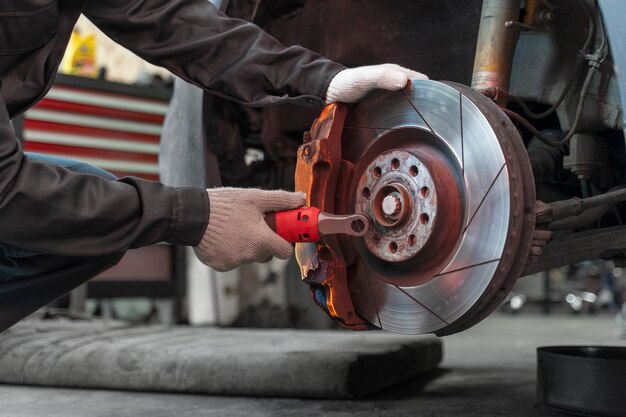
Your vehicle's brakes are not just components; they are your first line of defense on the road. As an American driver, ensuring the health and functionality of your brakes is crucial for your safety and your vehicle's well-being. In this comprehensive guide, we'll explore tips and tricks to help you master the art of brake maintenance.
Understanding Your Braking System
Before delving into maintenance, let's have a quick refresher on the critical components of your vehicle's braking system:
1. Brake Pads: These are the friction material that presses against the brake rotor to slow or stop the vehicle.
2. Brake Rotors (Discs): Rotors provide a surface for the brake pads to grip, generating the necessary friction to stop the vehicle.
3. Brake Calipers: Housings for the brake pads: calipers squeeze the pads against the rotor to create friction.
4. Brake Fluid: This hydraulic fluid transmits the force applied to the brake pedal to the brake components.
Signs Your Brakes Need Attention
Knowing when to perform brake maintenance is crucial. Look out for these signs that your brakes might need attention:
1. Squeaking or Grinding Noises: Unusual braking sounds can indicate worn brake pads.
2. Vibrations or Pulsations: Feeling vibrations or pulsations through the brake pedal could signify warped brake rotors.
3. Reduced Responsiveness: A soft or spongy brake pedal may signal air or moisture in the brake fluid.
4. Dashboard Warning Lights: Modern vehicles often have sensors that detect brake issues and trigger warning lights on the dashboard.
DIY Brake Maintenance Tips and Tricks
1. Regular Inspections
Perform visual inspections of your brake components regularly. Look for signs of wear on the brake pads, check for leaks around the calipers, and inspect the brake rotors for any uneven surfaces.
2. Brake Fluid Checks
Check the brake fluid level regularly and top it up if necessary. Brake fluid absorbs moisture over time, affecting its performance. If the fluid appears dark or murky, consider flushing and replacing it.
3. Brake Pad Replacement
Brake pads wear out over time, and neglecting them can lead to more expensive repairs. Inspect the thickness of the brake pads and replace them if worn down to the specified limit.
When to Seek Professional Help
While DIY brake maintenance is valuable, some tasks are best for professionals. Seek professional assistance in the following scenarios:
1. Brake Fluid Flush: Brake fluid replacement typically requires specialized equipment to ensure a complete and proper flush.
2. Complex Repairs: For issues like brake caliper replacement, rotor resurfacing, or brake line repairs, professional expertise is crucial.
3. ABS System Problems: Professional diagnostics and repairs are essential if your vehicle's Anti-lock Braking System (ABS) is malfunctioning.
Investing in Brake Health: A Long-Term Advantage
Prioritizing the maintenance of your vehicle's brakes is not just about immediate safety – it's an investment in the longevity and performance of your car. Regular checks and proactive maintenance enhance safety on the road and contribute to cost savings by preventing more extensive brake system repairs.
Navigating diverse roadways and mastering brake maintenance is a responsibility that comes with the privilege of driving. From regular inspections to understanding the signs of brake wear, the tips and tricks in this guide aim to empower you to keep your vehicle's brakes in optimal condition. By prioritizing brake health, you ensure your safety and contribute to the overall well-being of your car on the roads.